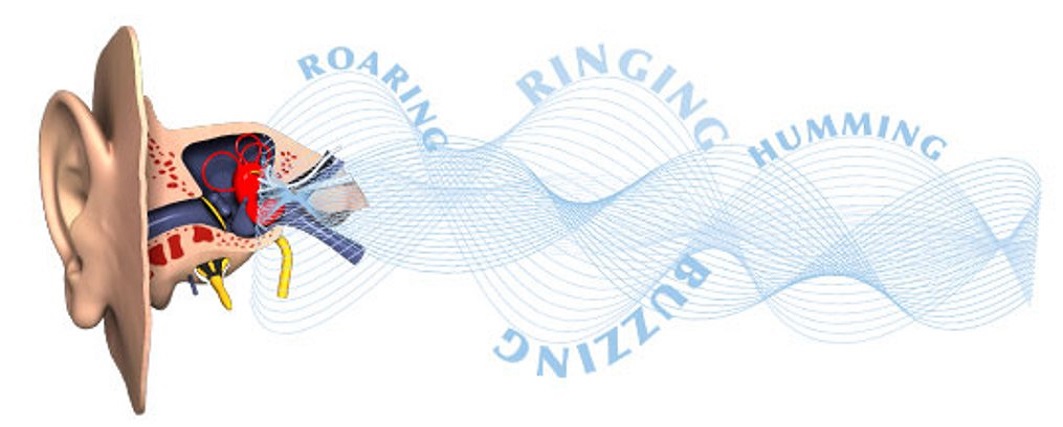Tinnitus
What is Tinnitus?
Tinnitus is a physical condition, experienced as noises or ringing in the ears or head when no such external physical noise is present. Tinnitus is usually caused by a fault in the hearing system; it is a symptom, not a disease in itself. The word "tinnitus" means "tinkling or ringing like a bell". Latin origin; usually pronounced tinn-itus, the "i" as in "sit". About one in five people with tinnitus have bothersome tinnitus, which distresses them and negatively affects their quality of life and/or functional health status. Those individuals with persistent and bothersome tinnitus will often seek medical care. Tinnitus may be an intermittent or continuous sound in one or both ears. Its pitch can go from a low roar to a high squeal or whine or it can have many sounds. Persistent tinnitus is tinnitus that lasts more than six months. Prior to any treatment, it is important to undergo a thorough examination and evaluation by your otolaryngologist (ENT doctor) and audiologist. An essential part of the treatment will be your understanding of tinnitus and its causes.
What cause Tinnitus?
Many causes - almost everything that can go wrong with our ears can produce tinnitus as a symptom! Perhaps as simple as wax against the eardrum, or as serious as a tumour on the hearing nerve. Otosclerosis (fixation of the tiny stirrup bone in the middle ear) can produce tinnitus; so can Meniere's disease. A major cause of tinnitus is EXPOSURE TO EXCESSIVE NOISE, e.g. chain saws, machinery, rock concerts. Noise destroys! Most of the time, the tinnitus is subjective—that is, the tinnitus is heard only by the individual. Rarely, tinnitus is “objective,” meaning that the examiner can actually listen and hear the sounds the patient hears. Tinnitus may be caused by different parts of the hearing system. The outer ear (pinna and ear canal) may be involved. Excessive ear wax, especially if the wax touches the ear drum, causing pressure and changing how the ear drum vibrates, can result in tinnitus. There are a number of non-auditory conditions and lifestyle factors that are associated with tinnitus. Medical conditions such as temporomandibular joint arthralgia (TMJ), depression, anxiety, insomnia, and muscular stress and fatigue may cause tinnitus, or can contribute to worsening of existing tinnitus.
What Can Make Tinnitus Worse?
- Loud Noise
- Stress and Fatigue
- Medications
What testing do i need?
When you are evaluated for tinnitus, the first thing the doctor will do is obtain a complete history, investigating potential causative factors, and perform a thorough, targeted physical examination. If the tinnitus is one-sided (unilateral), associated with hearing loss, or persistent, an audiogram (hearing test) should be obtained early in the evaluation. You may opt for an audiogram in any case. There is no need for radiologic testing (X-rays, CT scans or MRI scans) unless your tinnitus is unilateral, pulsatile, or associated with asymmetric hearing loss or neurological abnormalities. Your doctor will try to determine how bothersome your tinnitus is, by asking certain questions or having you complete a self-assessment questionnaire.
Do Many People Suffer From Tinnitus?
Yes, millions around the world! Probably 18% of Indians have tinnitus at some time of their lives and approximately '50 million Americans have tinnitus in some form'. Countries with self-help groups include USA, UK, Germany, Canada, New Zealand and, of course, India. Severe tinnitus is recognised as a very major affliction, but most people have tinnitus to a milder degree. Given time, commitment and up-to-date professional help, tinnitus can reduce for many people.
How is Tinnitus treated?
- Hearing Aids
- Therapeutic Noise Generator
Good quality and properly fitted hearing aids reduce and even eliminate most tinnitus associated with hearing losses. Hearing aids take away the strain of listening and distract from the tinnitus by bringing you more environmental sounds from the outside world.
Device which looks like a hearing aid and recommended for people with no hearing loss. It produces a blend of external sounds which stimulate most fibres of the hearing nerve helping to deviate attention away from the tinnitus.
Is there any operation to cure tinnitus?
For the vast majority of people there is no specific operation for tinnitus. However, following successful surgical treatment for some ear problems, an existing tinnitus may sometimes disappear, e.g. otosclerosis, Meniere's disease, middle ear infection.


